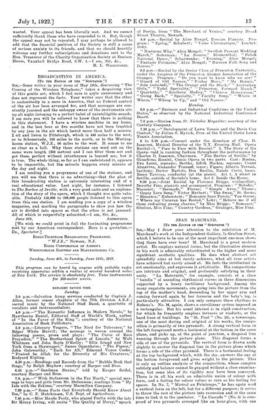BROADCASTING IN AMERICA.
ITo THE EDITOR or THE " SPECTATOR."]
Sts,—Some writer in your issue of May 13th, discussing " The Coming of the Wireless Telephone," takes a despairing view of this gentle art, which I feel sure is quite unnecessary and does not represent the facts. Your writer says that the ether is undoubtedly in a mess in America, that no Federal control of the air has been arranged for, and that messages are con- stantly jammed and the unhappy owner of the instruments sits up all night listening to a perfect babel of unintelligible sounds. I am sure you will be relieved to know that there is nothing in this statement. I have a wireless machine in my home, and in the last four or five months have not been troubled by any jam in the air which lasted more than half a minute. I sit and listen to Pittsburgh, which is 440 miles to the west, or to Schenectady, 150 miles to the north, or to the Westing- house station, W.J.Z., 60 miles to the west. It comes to me as clear as a bell. Why these stations can send out on the same wave length (360 metres) and I can filter them out and get them perfect without interference is beyond me; but it is true. The whole thing, so far as I can understand it, appears to be impossible, but the miracle happens every minute of the day and night.
r am sending you a programme of one of the stations, and you will see that there is no advertising—that the plan of this broadcasting station is extremely interesting and of a real educational value. Last night, for instance, I listened to The Barber of Seville, with a very good caste and an explana- tion of the story of the opera, which I thought was quite valu- able. Probably 150,000 to 200,000 people listened to this opera from this one station. I am sending you a copy of a wireless magazine, and marking the paragraphs to show you how the air is divided into spaces so that the ether is not jammed. All of which is respectfully submitted.—I am, Sir, &c.,
[We wish we could print in full the fascinating programme sent by our American correspondent. Here is a quotation.— ED., Spectator.]










































 Previous page
Previous page